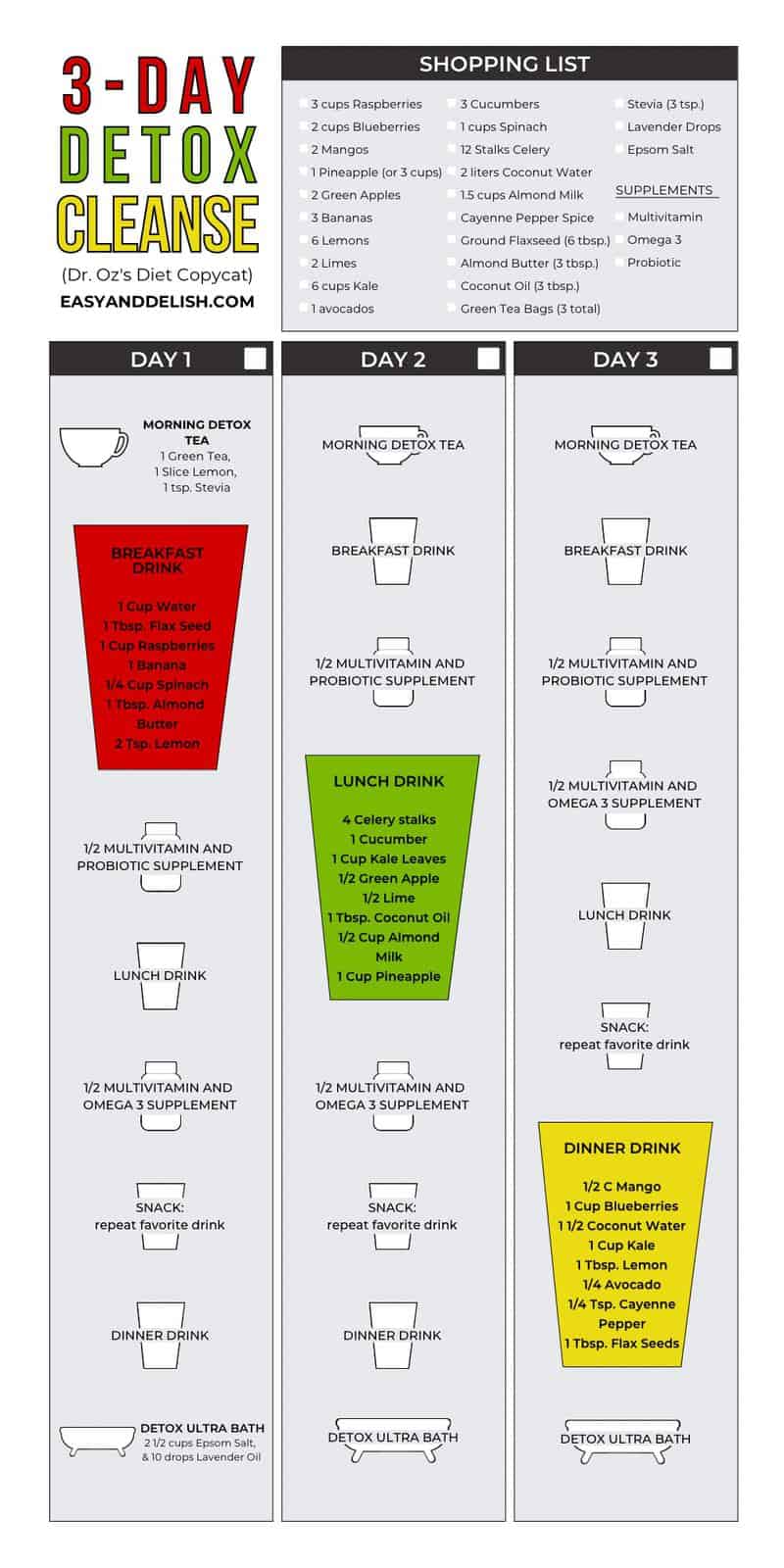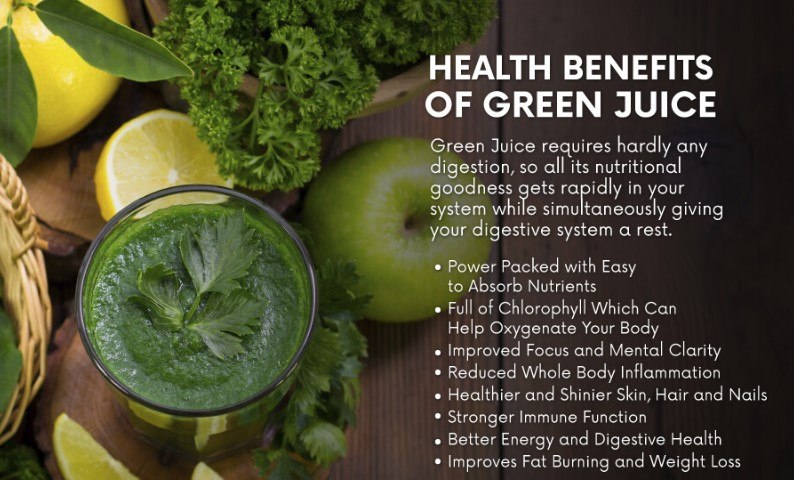Discover what to expect when juice fasting for three days. This comprehensive guide provides insights into physical and mental changes, including increased nutrient intake, weight loss, detoxification, and boosted energy levels. Whether you’re curious about the benefits or preparing for challenges, this article is your go-to resource.
Juice fasting, a popular detox trend, involves consuming only fresh fruit and vegetable juices for a designated period. If you have been considering embarking on a three-day juice fast, it is crucial to know what to expect throughout this experience. This article will provide you with valuable insights about the physical and mental changes that commonly occur during a juice fast, offering a comprehensive understanding of its potential effects on your body and mind. Whether you are curious about the benefits or preparing for the challenges ahead, this article is your go-to guide for discovering what to expect when juice fasting for three days.

Benefits of Juice Fasting for 3 Days
Increased nutrient intake
Juice fasting for three days allows you to significantly increase your intake of essential nutrients. Freshly pressed juices are rich in vitamins, minerals, and antioxidants that promote overall health and well-being. By consuming a variety of fruits and vegetables in liquid form, your body can easily absorb these nutrients and support optimal cellular function.
Weight loss
One of the main benefits of a juice fast is its potential for promoting weight loss. Since you’ll be consuming significantly fewer calories during this time, your body will start to burn stored fat for energy, resulting in gradual weight loss. Additionally, the high water content in juices can help curb your appetite and reduce calorie intake, further supporting your weight loss goals.
Detoxification
Juice fasting is often seen as a way to detoxify the body and remove harmful toxins accumulated through poor dietary choices and environmental factors. By providing your body with a concentrated dose of plant-based nutrients, a juice fast can stimulate the liver and enhance its natural detoxification processes, thus helping you eliminate toxins more efficiently.
Boosted energy levels
Contrary to common misconceptions, juice fasting can actually boost your energy levels. While initially, you may experience a decrease in energy due to the adjustment period, as the fast progresses, the high nutrient content in the juices will nourish your body and provide a sustainable source of energy. Many people report feeling more mentally alert and physically energized after completing a juice fast.
Improved digestion
The absence of solid foods during a juice fast gives your digestive system a break and allows it to repair and rejuvenate. This break from digesting heavy and processed foods can help improve digestion and relieve common gastrointestinal issues such as bloating, constipation, and indigestion. The high fiber content in juices also supports healthy bowel movements and promotes a balanced digestive system.
Enhanced hydration
Staying adequately hydrated is essential for overall health, and juice fasting can help you achieve the necessary hydration levels. Since fresh juices are primarily water-based, they provide a rich source of hydration for your body. Proper hydration contributes to healthy skin, improved organ function, and optimal physical performance.
Effects on the Body During Juice Fasting
Initial hunger and cravings
At the beginning of your juice fast, it’s common to experience hunger pangs and intense cravings for solid foods. This is primarily due to your body adjusting to the change in eating habit and the absence of solid food textures. It’s important to stay focused on your goals and remind yourself of the benefits that lie ahead.
Possible headaches and fatigue
During the first few days of a juice fast, you may experience mild headaches and fatigue as your body adapts to the lower caloric intake. This is a normal part of the detoxification process, and these symptoms usually subside as your body adjusts. Staying well-hydrated and getting enough rest can help alleviate these temporary discomforts.
Changes in bowel movements
As your body detoxifies during a juice fast, you may notice changes in your bowel movements. Some individuals may experience increased frequency, while others may experience a temporary decrease or even slight constipation. These changes are generally transient and will regulate themselves as your body adjusts to the juice fast.
Fluctuations in blood sugar levels
Since juices primarily consist of fruits and vegetables, which naturally contain sugars, there can be fluctuations in blood sugar levels during a juice fast. While the fiber in whole fruits helps regulate blood sugar spikes, juices lack this fiber content. It’s important to choose juices that are lower in sugar and monitor your blood sugar levels if you have any existing medical conditions related to blood sugar regulation.
Altered taste perceptions
During a juice fast, your taste perceptions may change. Since you’ll be consuming mainly liquids with concentrated flavors, your taste buds may become more sensitive or even experience temporary alterations. Some individuals may find this change in taste perception as an added benefit, as it can help reset their palate and reduce cravings for unhealthy, processed foods.
Potential mood swings
The detoxification process and the absence of solid foods can sometimes contribute to mood swings during a juice fast. Some individuals may experience heightened emotions, irritability, or even feelings of euphoria. These mood swings are often temporary and can be managed through self-care practices such as meditation, light exercise, or spending time in nature.

Preparing for a 3-Day Juice Fast
Consultation with a healthcare professional
Before embarking on a three-day juice fast, it’s crucial to consult with a healthcare professional, especially if you have any underlying health conditions or are taking medications. They can assess your individual health status and provide personalized guidance to ensure the juice fast is safe and suitable for you.
Choosing the right juicer and ingredients
Investing in a good quality juicer is essential for a successful juice fast. Look for juicers that extract maximum nutrients and produce minimal heat to preserve the enzymes in the fruits and vegetables. Additionally, choose fresh, organic produce to ensure you’re consuming the highest quality ingredients free from pesticides and other harmful chemicals.
Gradual transition to a juice-only diet
To ease your body into the juice fast, it’s advisable to gradually transition to a juice-only diet for a few days before the fast. Start by incorporating more fruits and vegetables into your meals, gradually reducing solid foods. This allows your body to adapt to the change and minimizes the intensity of detoxification symptoms.
Stocking up on necessary supplies
Before starting your juice fast, make sure you have all the necessary supplies. Stock up on a variety of fresh fruits and vegetables, as well as storage containers for your juices. Having everything prepared and readily available will make the juice fast more convenient and help you stay committed.
Creating a juice schedule
Planning a juice schedule can help you stay on track throughout the fast. Decide how many juices you will consume each day and at what times. This will provide structure to your day and ensure you’re getting a balanced intake of nutrients. It’s also helpful to experiment with different juice combinations to keep your taste buds engaged.
Monitoring hydration
During the three-day juice fast, it’s crucial to monitor your hydration levels. Aim to drink at least eight glasses of water in addition to your juices to ensure optimal hydration. This will support the detoxification process, keep your organs functioning properly, and prevent dehydration.
What to Expect on Day 1 of Juice Fasting
Feeling hungry and craving solid foods
On the first day of your juice fast, it’s common to experience intense hunger and persistent cravings for solid foods. Your body is adjusting and detoxifying, and these feelings are a natural part of the process. Remind yourself of your goals, stay focused, and find ways to distract yourself from the cravings.
Increased bathroom visits
As your body starts flushing out toxins, you may experience an increased frequency of urination and bowel movements. This is a positive outcome, as it indicates that your body is effectively eliminating waste and cleansing itself. Stay hydrated during this process to support your body’s detoxification efforts.
Possible detox symptoms
During the initial stages of the juice fast, you may experience mild detox symptoms such as skin breakouts, body odor, or bad breath. These symptoms are temporary and indicate that your body is releasing toxins. Supporting your body with proper hydration and rest will help alleviate these symptoms.
Potential decrease in energy levels
While some individuals may experience an increase in energy during the juice fast, others may initially feel a decrease in energy levels. This is normal, as your body adjusts to the lower caloric intake. Ensure you’re getting enough rest and allow your body to adapt. As the fast progresses, you’ll likely experience a surge in energy.
Finding motivation to continue
As you navigate through the first day of your juice fast, finding motivation to continue is crucial. Remind yourself of the benefits you’ll reap from completing the fast, such as increased energy, weight loss, and improved health. Stay focused on your goals and take this opportunity to reflect on your commitment to self-care and well-being.

What to Expect on Day 2 of Juice Fasting
Possible weight loss
By the second day of the juice fast, you may start noticing initial weight loss. Since you’re consuming fewer calories than your body needs, it begins to utilize stored fat for energy. However, it’s important to remember that weight loss results can vary for each individual, and maintaining a healthy mindset is key.
Continued detoxification effects
As you progress into the second day, the detoxification effects of the juice fast will continue. Your body will continue to eliminate toxins through urine, sweat, and bowel movements. This ongoing detox process can contribute to improved skin complexion, increased mental clarity, and an overall feeling of rejuvenation.
Gradual decrease in hunger
While you may still experience some hunger pangs on the second day, it’s common for the intensity of the hunger to gradually decrease. This is a positive indication that your body is adapting to the juice fast and utilizing stored energy reserves. Stay committed and engage in activities that distract you from any lingering cravings.
Mind over matter challenges
As the juice fast progresses, you may encounter mental challenges that test your resilience. Mind over matter becomes essential during this stage. Stay committed to your goals, remind yourself of the benefits you’re experiencing, and engage in positive self-talk to overcome any mental hurdles.
Seeking support or motivation
During the second day of the juice fast, reaching out for support or seeking motivation can be helpful. Connect with friends or family members who understand your journey or join online communities where you can share experiences and gain encouragement from others on a similar path. Being part of a supportive network enhances your chances of successfully completing the fast.
What to Expect on Day 3 of Juice Fasting
Possible breakthrough in hunger cravings
On the third and final day of the juice fast, you may experience a breakthrough in hunger cravings. Many individuals report feeling a reduced appetite and a sense of satisfaction from the juices alone. This hunger breakthrough is a positive sign that your body has adjusted to the juice fast, and you’re nearing the end of the detoxification process.
Increased mental clarity
By the third day, some individuals experience heightened mental clarity and improved focus. This mental boost can be attributed to the absence of heavy, processed foods and the high nutrient content in the juices. Enjoy this mental clarity and embrace the benefits it brings to your daily tasks and overall cognitive function.
Feeling lighter and more energized
As you approach the end of the juice fast, you may notice feeling physically lighter and more energized. The weight loss and detoxification effects of the fast contribute to this newfound sense of vitality. Embrace this lightness and use it as a motivator to maintain healthy eating habits beyond the juice fast.
Detox symptoms may temporarily worsen
On the third day, some individuals may experience temporary worsening of detox symptoms. This is a common occurrence known as a “healing crisis.” As your body works diligently to eliminate toxins, it’s not uncommon for some symptoms to resurface before subsiding completely. Stay hydrated, get ample rest, and trust in your body’s ability to heal.
Reflecting on the experience
The final day of the juice fast serves as an opportunity for reflection and introspection. Take the time to evaluate your experience, noting any physical, mental, or emotional changes you’ve noticed. Understand the growth and lessons learned during the fast, and carry this newfound knowledge with you as you transition back to regular eating habits.

Tips for a Successful 3-Day Juice Fast
Listening to your body
Throughout the juice fast, it’s important to listen to your body and respond to its needs. If you feel overly fatigued or lightheaded, consider increasing your juice intake or adjusting the ingredients to ensure you’re receiving adequate nutrients. Trust your intuition and make adjustments accordingly.
Staying hydrated
Hydration is essential during a juice fast. Apart from the juices you consume, make sure to drink sufficient water throughout the day to support the detoxification process and prevent dehydration. Carry a water bottle with you as a reminder and set hydration goals to ensure you’re meeting your daily intake.
Engaging in light exercise
While intense exercise is not recommended during a juice fast, incorporating light exercise can be beneficial. Engaging in activities such as stretching, yoga, or gentle walks can help stimulate blood flow, support lymphatic drainage, and promote a sense of overall well-being. Listen to your body and choose activities that feel right for you.
Preparing juices in advance
To make the juice fast more manageable and convenient, consider preparing your juices in advance. Invest in quality storage containers and spend some time preparing and refrigerating your juices for the upcoming days. This way, you’ll have quick access to fresh, nutritious juices without the added effort of daily preparation.
Finding alternative sources of support
During a juice fast, finding sources of support is crucial for staying motivated and accountable. Seek out friends, family, or online support groups where you can share your challenges and successes. Connecting with others on a similar journey can provide valuable insight, motivation, and encouragement.
Being mindful of the post-fast period
As the juice fast comes to an end, it’s important to approach the post-fast period mindfully. Gradually reintroduce solid foods into your diet, starting with easily digestible options such as steamed vegetables, soups, or smoothies. Avoid indulging in heavy or processed foods too soon, as this can negate the benefits of the fast and potentially cause discomfort.
Breaking the Juice Fast Safely
Introducing solid foods gradually
After completing a 3-day juice fast, it’s crucial to reintroduce solid foods gradually. Start with easily digestible foods such as fruits, vegetables, and plant-based proteins. Slowly reintroduce complex carbohydrates, whole grains, and lean proteins over the course of a few days to allow your digestive system to readjust.
Starting with easily digestible foods
When breaking the juice fast, it’s advisable to start with easily digestible foods to avoid overwhelming your digestive system. Incorporate foods such as smoothies, soups, and light salads into your diet. These options provide essential nutrients while being gentle on your digestive system.
Monitoring how your body reacts
As you reintroduce solid foods, it’s important to pay attention to how your body reacts to each food. Monitor any signs of discomfort or digestive issues, such as bloating or indigestion. This will help you identify any potential food sensitivities or allergies and adjust your diet accordingly.
Maintaining a healthy lifestyle
Completing a juice fast is just the beginning of a healthy lifestyle journey. After breaking the fast, it’s important to maintain balanced and nutritious eating habits. Incorporate a variety of fruits, vegetables, whole grains, and lean proteins into your diet to continue reaping the benefits of improved health and well-being.
Seeking professional guidance if needed
If you have any concerns or questions about breaking the juice fast safely, don’t hesitate to seek professional guidance. A registered dietitian or healthcare professional can provide personalized advice based on your specific needs and help ensure a smooth transition back to a regular eating routine.

Precautions and Potential Risks
Lack of essential nutrients
While a juice fast can be beneficial for a short duration, it’s important to acknowledge that it may not provide adequate amounts of all essential nutrients in the long term. Consistently depriving your body of solid foods may lead to nutrient deficiencies if not properly balanced or supplemented. Therefore, it’s advisable to consult with a healthcare professional before attempting any extended juice fast.
Limited caloric intake
During a juice fast, your caloric intake is significantly reduced. While this can contribute to weight loss, it may not provide enough energy for intense physical activity or those with higher caloric needs. If you have an active lifestyle or underlying health conditions, it’s important to consult with a healthcare professional to ensure the juice fast is safe and appropriate for you.
Digestive issues
Some individuals may experience digestive issues during or after a juice fast. These can include bloating, gas, or changes in bowel movements. While these symptoms are generally temporary and resolve on their own, it’s important to pay attention to your body’s response. If you experience prolonged or severe digestive issues, consult with a healthcare professional.
Blood sugar imbalances
Due to the high sugar content in some fruit juices, individuals with diabetes or insulin resistance should exercise caution during a juice fast. The rapid absorption of fruit sugars without the accompanying fiber can cause blood sugar imbalances. Monitoring blood sugar levels closely and choosing low-sugar juices can help minimize these risks.
Not suitable for everyone
A 3-day juice fast may not be suitable for everyone. Pregnant or breastfeeding women, individuals with certain medical conditions, or those who are underweight should avoid juice fasting or seek guidance from a healthcare professional. Each person is unique, and individual health considerations should always be taken into account.
Possible rebound effects
After completing a juice fast, there is a potential for rebound effects if you revert to unhealthy eating habits. It’s essential to use the juice fast as a foundation to transition to long-term sustainable eating patterns. Gradually reintroduce whole foods, focus on balanced meals, and make conscious choices to maintain the improvements achieved during the juice fast.
Conclusion
Embarking on a three-day juice fast can provide several benefits, including increased nutrient intake, weight loss, detoxification, boosted energy levels, improved digestion, and enhanced hydration. Understanding the potential effects and challenges that may arise during the fast will help prepare you mentally and emotionally. It’s important to take necessary precautions, such as consulting with a healthcare professional, choosing the right juicer and ingredients, and gradually transitioning to a juice-only diet. Listening to your body, staying hydrated, engaging in light exercise, and finding alternative sources of support are also crucial for a successful juice fast. Breaking the juice fast safely and gradually reintroducing solid foods is essential for maintaining the benefits and avoiding digestive issues. Lastly, always prioritize your health and seek professional guidance when needed. By listening to your body and monitoring its response, you can ensure a safe and successful juice fast experience.
